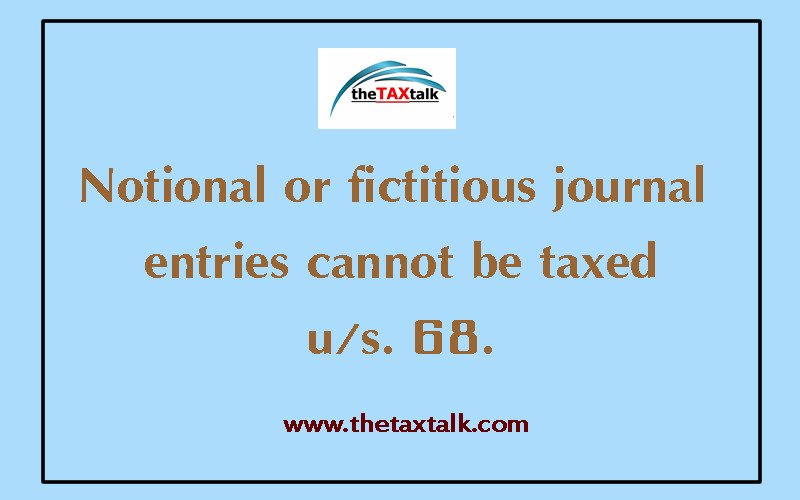![]()
Notional or fictitious journal entries cannot be taxed u/s. 68.
The Honble ITAT Delhi in the case of DCIT vs. Glass Tech India Decision ITA No.: 6241/Del/2017 [Date of order: March 25, 2022] has made an important and far reaching ruling on the taxation of fictitious journal entries cannot be taxed u/s. 68.
It has concluded that fictitious journal entries cannot be taxed u/s. 68.
In this case, Assessee was a partnership firm. Assessee had received cheques aggregating to Rs. 4 crores from its partners which was shown as capital contribution for the year ending 31.03.2014. This exercise was done just to improve the bank ratio to satisfy the bankers about the financial viability for credit facilities. Immediately, in the next financial year the Assessee returned these cheques to the partners and reversed the entry of capital contribution.
The AO assessed this fictitious/notional entry of Rs. 4 crore as unexplained cash credit and added the same u/s. 68 of the Act. The CIT(A) had deleted this addition on the ground that there was no actual flow of funds; hence, section 68 was not applicable.
The issue before ITAT was whether addition u/s. 68 can be made for fictitious/notional entries in books of accounts?
The observation and ruling by the Honble ITAT was as under:
-
For the purpose of making addition u/s. 68 the amount has to be actually received by the Assessee as inter-alia held by Hon’ble Rajasthan High Court in the case of CIT v. Kishorilal Santoshilal [1995] 216 ITR 9 (Raj. HC).
-
Reliance was placed on the decision in the case of ITO vs. Zexus Air Services Pvt. Ltd. [ITA 2608/Del/2018 – ITAT, Delhi] wherein it was held that the words “any sum” appearing in section 68 cannot be taken as parallel to “any entry”. There has to be actual flow of funds and addition cannot be made merely on account of a journal entry.
-
Accordingly, it was held that it was not just entry of cash credit in the books of accounts that would create liability, but there should be an actual flow of funds.
-
Where the books of accounts on its own establish that the entry was fictitious and sham for window dressing then the initial burden on the revenue is not discharged to shift onus on the assessee to explain further identity, capacity and genuineness of the source.
-
Ratio laid down by Hon’ble Calcutta High Court in Jatia Investment Co. Ltd. V. CIT(1994) 206 ITR 718 (Cal) that fictitious entry not backed up by funds were not be taxable as “Cash Credit”, was followed and addition was held invalid.

